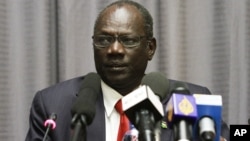South Sudanese Information Minister Michael Makuei said at the weekend that journalists who report the views of rebels led by former vice President Riek Machar are "rebels and agitators" and could face prosecution.
Speaking at a forum Sunday, where journalists, human rights activists and government officials discussed the role of the media in nation-building, Makuei said that including the rebels' side in a news story meant "...you are actually disseminating material of the enemy."
"When you are disseminating material of the rebels in the country you are actually agitating the people against the government," he said.
It was not the first time Makuei has told journalists not to report the rebels’ side of a story. In March of this year, he warned journalists not to broadcast or publish interviews with rebels in South Sudan because doing so would land reporters on the wrong side of the law.
A South Sudanese legal expert told VOA at the time that South Sudan's penal code does not bar journalists from broadcasting interviews with rebels.
The expert, who spoke from an undisclosed country of exile and asked not to be named for reasons of personal safety, also said "everyone in South Sudan has the right to attain any interview" and to communicate freely.
Journalism ethics vs. government orders
Long-time journalist Alfred Taban, who is the editor of The Juba Monitor newspaper and acting head of the Association for Media Development in South Sudan (AMDISS), said Makuei’s logic in issuing the warning to journalists was flawed.
“This idea of saying you should only report one side the side of the government, because when you report the rebel side is like you are inciting the rebels, this is absolutely nonsense. This is not true,” he said.
Taban said South Sudanese journalists are guided by their profession's code of conduct, not by a government order.
"Journalists have a duty to their readers and to their listeners and that means reporting on both sides -- the side of the government and the side of the rebels," he said.
But Makuei insisted that any journalist who does not operate within what he said is South Sudanese law risked ending up in court.
Makuei’s warning came weeks after National Security Service officers closed down a Catholic Church-owned radio station, Bakhita Radio, after it broadcast the rebel side of a story about renewed fighting in Unity state. The radio station's journalists also broadcast the government side, but that was not enough to stop the government from shutting down the station, which is still closed.
New media laws
At the same forum, presidential spokesman Ateny Wek Ateny said President Salva Kiir on Tuesday will sign into law three bills that, on paper at least, will broaden the right of all citizens to obtain information, improve oversight of the media and expand media operations in South Sudan to include an independent public service broadcaster.
The three media bills were approved by parliament more than nine months ago. Ateny blamed the delay in receiving Kiir's on a government official who had misplaced them.
The bills were supposed to be signed at a ceremony on Monday that, ironically, was to have been closed to the media. But at the last minute Ateny said the bills would be endorsed by Mr. Kiir on Tuesday and journalists could attend.





